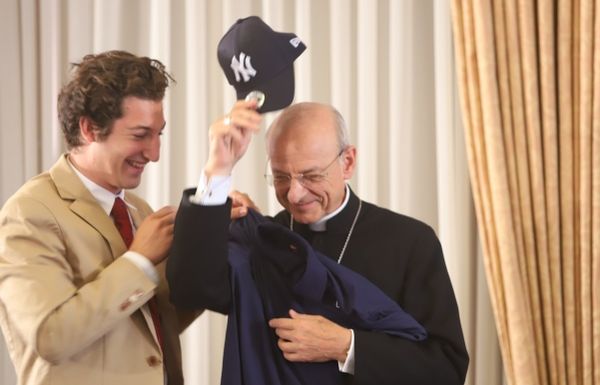Thursday, July 11
In the morning the Prelate met with more than 500 men from New York, Boston and Washington, and others from as far away as Pittsburgh, Atlanta, North Carolina and Miami.
The Prelate began by saying that, faced with the great mission of placing Christ at the summit of all human activities, we could easily become disheartened – overcome by the awareness of our own limitations and the crises in the Church and the world. “But all this should never be an occasion for discouragement,” he said. “God counts on us as we are, with our limitations, to do a lot of good. In this great country of the United States, so much has already been done. But we are still in the beginnings. We can think that the Work has already been in this country for a long time [Opus Dei began its apostolic activities in the U.S. in 1949], and that it was founded ninety years ago. But, for history, ninety years is still just the beginning of the beginning.”
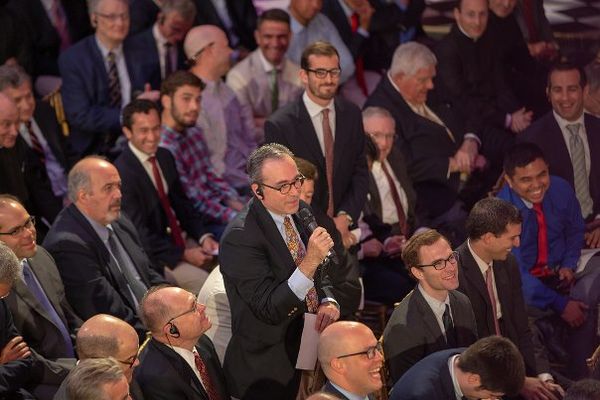
In the question-and-answer session that followed, Sharif asked about the fear many people have of making personal commitments today. “When freedom is not employed in a meaningful commitment, a person is at the mercy of the four winds, at the mercy of their feelings. Instead of being guided by the intellect and one's own freedom, a person is guided by feelings that vary with circumstances,” the Prelate said.
In answer to a question about the challenge of forming true friendships at work, where relationships can often be based on immediate needs, Monsignor Ocáriz replied that we have to break out of this pattern by taking the initiative. “First, certainly, through prayer, by praying for your colleagues. And then, look for opportunities for small acts of service. Not as a kind of tactic but because you really want to help them. They will see that you have a different attitude, a true interest in helping them. And this can help you break through barriers, and can give rise to deeper conversations.”
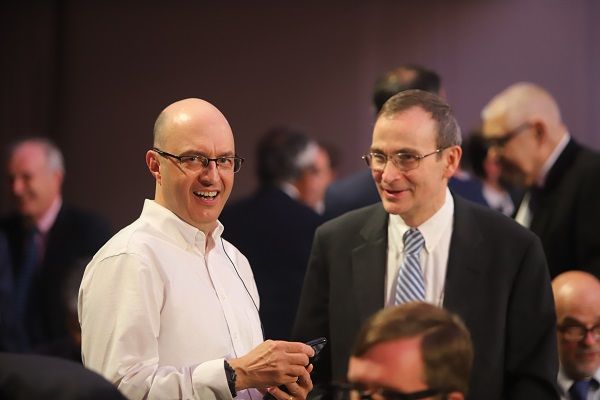
At the end of the meeting, Monsignor Ocáriz once again asked for prayers for the Pope. “He bears a tremendous weight on his shoulders. When he talks to people, when he writes letters, he ends by saying, 'pray for me, pray for me.' He has great faith in prayer, and we too should have that faith.”
In the afternoon, the Prelate met with a group of over 600 women of the Prelature. A central topic was the need for joy. "We have an obligation to be happy,” he told them. “And when we aren't happy, we can't simply wait for joy to return on its own. We need to seek it. We need go to the source of joy, which is our Lord. Then we can also help make life pleasant for the others. We need to be joyful in order to do apostolate."
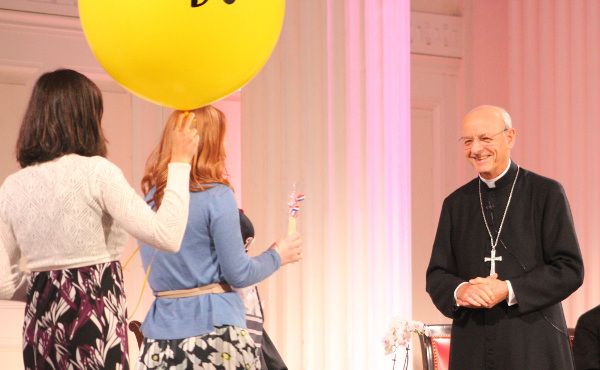
Several of the questions touched on the topic of the mystery of suffering. Monsignor Ocáriz insisted that, although it might seem contradictory, we can experience joy in the midst of suffering. "This is possible when we know through our faith that even suffering, when it comes, is an instrument for assisting Christ in the redemption of the world. Even though it doesn't take away the suffering, we can have the joy of knowing that this suffering has a very great positive value when it is united to our Lord's Cross."
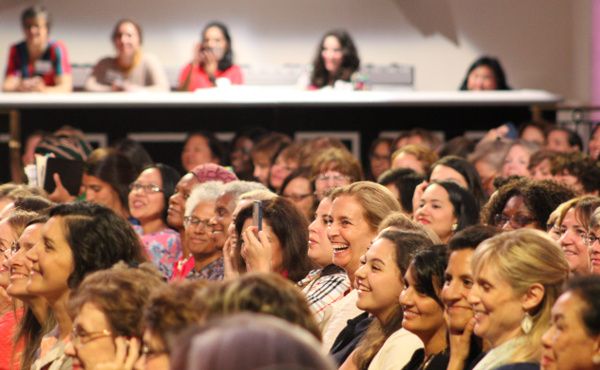
Since attendees came from many different cities where the Prelate will not be able to visit, they decided to "bring the East Coast to him." Representatives from each city in the East Coast where there are centers of Opus Dei presented him with candy and a baseball cap from their hometown team, prompting the Prelate to joke that he will have quite a hat collection by the end of the trip.
Wednesday, July 10
In the morning, Monsignor Ocáriz made a brief visit to Saint Agnes Church, located near Grand Central Station in Manhattan. In 2016 Cardinal Timothy Dolan, the Archbishop of New York, asked Opus Dei to provide a pastor and priests to take care of St. Agnes and the many commuters and parishioners who pass through this church each day.
The Prelate then went to Ground Zero in lower Manhattan, where the World Trade Center once rose up. Monsignor Ocaríz stood quietly praying at the Ground Zero Memorial, which has the names inscribed of the 2,983 people who died in the World Trade Center attacks.
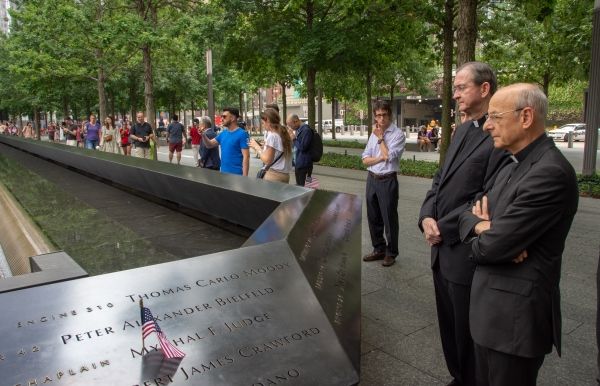
In the afternoon, the Prelate met with over 250 young women from major East coast cities who attend activities in centers of Opus Dei. Brightly colored panels covered the windows, each with a design representing the different home cities of those there, and he was presented with a large “passport” to bring to the U.S. cities where he will be traveling.
The Prelate began by encouraging them to pass on the Christian formation they have received to others.
“Don’t consider the formation you receive as something simply for yourself, for your own personal enrichment. It is that, but it is also meant to help you pass on, wherever you are, the Christian spirit. All Christians have to be apostles, in their daily life and above all in their friendships, passing on the joy of having encountered Christ more closely. Ultimately, all the Christian formation we receive is aimed at helping us become more like Christ, to have his same sentiments, his way of looking at the world and at persons,” Monsignor Ocariz told the young women.

Colleen, a student at Virginia Tech, said it can be difficult to have deeper friendships when others learn she takes her faith seriously and become afraid to bring up certain topics with her.
The Prelate acknowledged that “forming true friendships isn’t easy. It’s not the same to be truly a friend as simply to be an acquaintance, someone you say hello to once in a while. To be a true friend you need to dedicate time and have frequent personal contact, and often this requires sacrifice. But it’s worth it!”
He added that “all the strength we need to be able to speak in a convincing way can be found in the Eucharist and in prayer. We need to ask our Lord how to confront these situations. But in the end, when we strive to create authentic friendships, this fear to talk about certain topics disappears.”
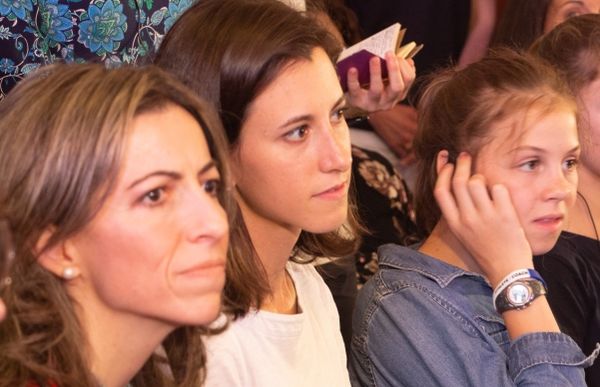
In response to a question about how to explain to her friends that God is more than just a rule-maker, the Prelate suggested that “a deeper way to explain this is by pointing to Christ on the Cross. We need to realize that God is so much our Father that He gave his Only Son to die for us on the Cross. The fact that He wanted to do this is a bit of a mystery, but it’s the mystery of God’s immense love for us. When things become hard and we have the temptation to think, ‘How is God my Father and yet he permits this,’ we need to look at the Cross, and make an act of faith in God’s love that He made so visible in the Cross of Christ.”
At the very end of the get-together, Daniela, a student from Harvard, and Paz, from Boston University, presented the Father with a gift of a donation that a group of many of the attendees had raised to help the centers of Opus Dei in Venezuela, to show their gratitude for all they have received from the Work and to help young people in Venezuela to receive the same formation. That raised a big round of applause from the whole room.”
Tuesday, July 9
On Tuesday July 9, Monsignor Fernando Ocáriz had a get-together with young people involved in the Prelature’s apostolic activities. Afterwards, he went to Saint Patrick’s Cathedral to visit Cardinal Timothy Dolan, Archbishop of New York.
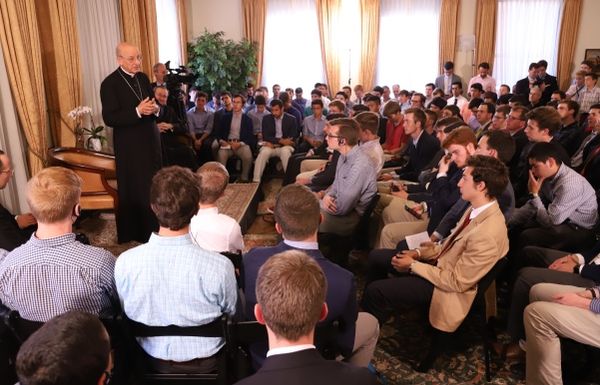
At the meeting with young people, the Prelate responded to questions from a group of around 200 young men from across the East Coast. In his answers, Monsignor Ocáriz returned more than once to the importance of being a good friend and sharing with our friends our love for Christ. For example, Joe, from Connecticut, asked how he could help his friends be detached from the over-use of technology. He said his friends were intrigued by his own decision three years ago to give up his smartphone and use a simpler phone instead.
When asked how we can help our friends to have a positive attitude towards technology, the Prelate replied: “The most important thing, in this particular case as with everything else, is the concern we all should have to help others and to let ourselves be helped, because we all need to be helped, in one way or another. What’s fundamental here is friendship.”
In his answer to a Princeton student who works in Artificial Intelligence, an environment where the attitude to the faith is often skeptical, Monsignor Ocáriz returned to the theme of friendship. “How can we speak about God in that environment? In general, it’s not usually a question of talking to many people at the same time, but about making true friendships with others ... By way of friendship, it’s easy to convey what you feel, what you think, not with the tone of trying to convince your friends but simply by passing on, through friendship, what you have inside, what you think, what you feel, what has value for you, what gives you joy, what gives you serenity, what the security of having God's constant assistance means for you in your life.”

The Prelate also stressed the importance of praying for and being united to the Pope. “Pray a lot for the Pope,” he said. “The Pope has, as you can easily imagine, a huge weight on his shoulders, with many problems to solve. There are also many problems within the Church itself. But we shouldn't be discouraged when we see the problems that exist in the Church. Because, as Saint Josemaria said, the Church fundamentally is Jesus Christ ... Therefore we should not be discouraged by difficulties in or outside the Church. We need to pray a lot for the Pope because he has a huge job, a huge responsibility, and he counts a lot on everyone's prayer.”
After the meeting with young people, the Prelate went with Monsignor Thomas G. Bohlin, the U.S. Vicar of Opus Dei, to visit Cardinal Dolan. They met for about an hour, talking in the Cardinal’s residence. Then the Cardinal accompanied them to the Cathedral, where they went to the Lady’s Chapel, making a brief visit to the Blessed Sacrament.
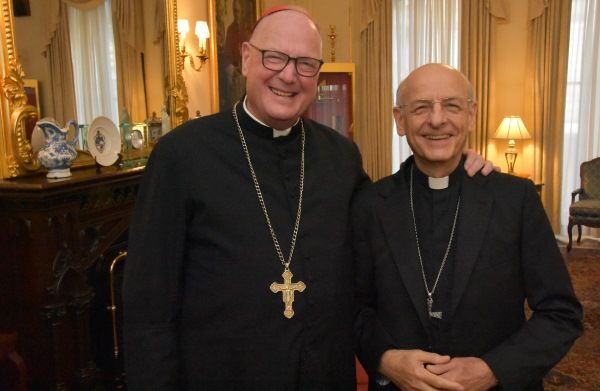
Monday, July 8
On Monday July 8, Monsignor Fernando Ocáriz visited the New York campus of IESE Business School. There he met with people working in academia, and spoke about the need for an authentic understanding of human love and freedom.
As Prelate of Opus Dei, Monsignor Ocáriz is Chancellor of the University of Navarra. IESE Business School, although located in Barcelona, is part of that university. Monday was his first visit to the school’s New York campus, which opened in 2009.
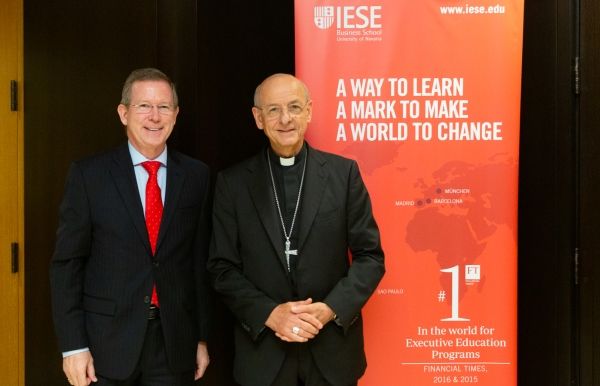
Monsignor Ocariz was welcomed to IESE by its U.S. head of operations, associate dean Eric Weber. After visiting IESE’s chapel, he was given a tour of the facility and met with the staff, who presented him with a bouquet of roses. Those greeting him included Luis Casas and his wife Mariana, Nina Lagdameo and her husband Gerard, along with several of their children.
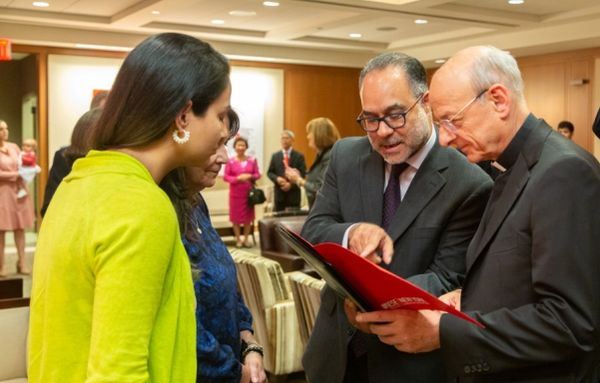
After this, the Prelate attended an academic session organized by the Witherspoon Institute, a Princeton-based independent research center that works to enhance public understanding of the moral foundations of democratic societies. Among those present were Princeton professor of political philosophy, Robert George, First Things editor, R. R. Reno, and CanaVox executive editor, April Readlinger. Opening remarks were given by Russel J. Snell, director of the Center on the University and Intellectual Life at Witherspoon, who spoke about some cultural challenges encountered today in educating young people.
The Prelate’s response and the discussion that followed centered on the topic of properly understanding love, which nowadays is often reduced to mere sentimentalism. He said that freedom can be understood properly only when we see that it needs to stem from authentic love. Love is not just about feelings, he said, but requires desiring the good of the other. If love is limited to simply enjoying the other person, it becomes a form of selfishness. He stressed that education in the meaning of freedom is important in forming the character of young people.
Sunday, July 7
Monsignor Fernando Ocáriz arrived Sunday afternoon, July 7, at John F. Kennedy Airport in New York, for a month-long pastoral trip to the United States. After spending a few days resting in early August, he will then go to Canada to meet with faithful of the Prelature and friends there.
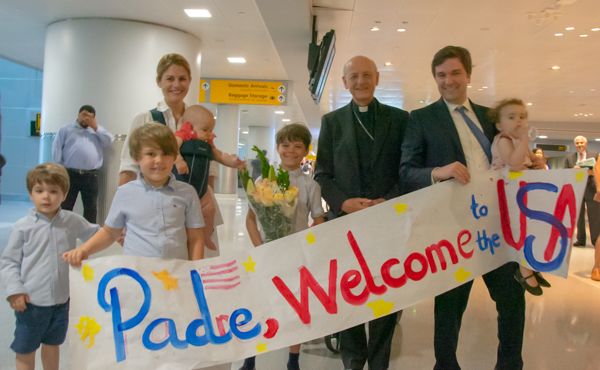
Among those greeting the Prelate at the airport were the Vicar of Opus Dei for the U.S., Monsignor Thomas G. Bohlin, and Patricia and Thomas White and their five children. Patricia, who has a background in graphics design, created with her family a welcoming banner, “Padre, Welcome to the USA.”
